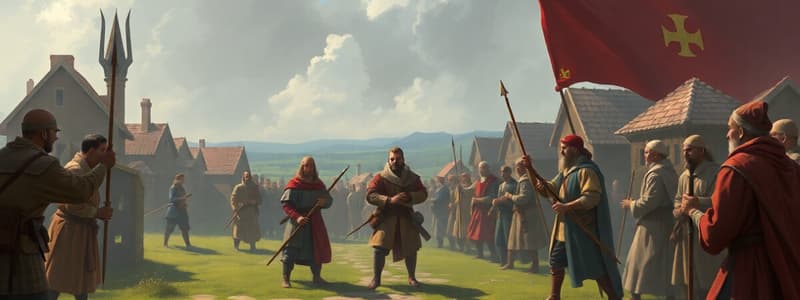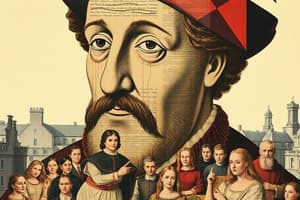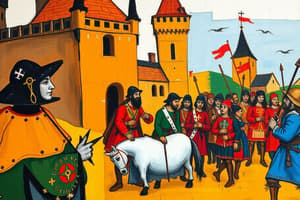Podcast
Questions and Answers
What was the main cause of the Peasants' Revolt of 1381?
What was the main cause of the Peasants' Revolt of 1381?
- Support for the English king’s claims to France
- A call for greater military action
- High taxes and unfair treatment of peasants (correct)
- Desire for more land among the nobles
Who led the Peasants' Revolt of 1381?
Who led the Peasants' Revolt of 1381?
- Wat Tyler (correct)
- King Edward III
- Richard II
- John of Gaunt
What significant event marked the end of the Peasants' Revolt?
What significant event marked the end of the Peasants' Revolt?
- The execution of the peasants
- The death of Wat Tyler (correct)
- The reduction of the Poll Tax
- The signing of a peace treaty
What major change in perception did the Peasants' Revolt signify?
What major change in perception did the Peasants' Revolt signify?
What was the primary conflict during the Hundred Years' War?
What was the primary conflict during the Hundred Years' War?
Which weapons gave the English an advantage in the Hundred Years' War?
Which weapons gave the English an advantage in the Hundred Years' War?
What notable societal change followed the Hundred Years' War?
What notable societal change followed the Hundred Years' War?
What was one major consequence of the Black Death on the labor structure in England?
What was one major consequence of the Black Death on the labor structure in England?
How did the Peasants' Revolt affect the relationship between common people and their rulers?
How did the Peasants' Revolt affect the relationship between common people and their rulers?
What was the Poll Tax introduced by the king's government?
What was the Poll Tax introduced by the king's government?
What was one reason Geoffrey Chaucer began writing in English instead of French?
What was one reason Geoffrey Chaucer began writing in English instead of French?
What was the nature of Chaucer's most famous work, 'The Canterbury Tales'?
What was the nature of Chaucer's most famous work, 'The Canterbury Tales'?
What significant contribution did John Wycliffe make to religious literature?
What significant contribution did John Wycliffe make to religious literature?
Which group followed John Wycliffe's ideas and spread them around England?
Which group followed John Wycliffe's ideas and spread them around England?
What major change occurred in the English language around the time of the Age of Chaucer?
What major change occurred in the English language around the time of the Age of Chaucer?
During Chaucer's travels, which countries did he predominantly visit?
During Chaucer's travels, which countries did he predominantly visit?
What was one of the impacts of the Hundred Years' War on English literature?
What was one of the impacts of the Hundred Years' War on English literature?
How did Chaucer's writing style differ from most writers of his time?
How did Chaucer's writing style differ from most writers of his time?
What was the belief of the Lollards regarding the Church's wealth and power?
What was the belief of the Lollards regarding the Church's wealth and power?
What were the societal effects of Wycliffe's translation of the Bible into English?
What were the societal effects of Wycliffe's translation of the Bible into English?
Flashcards
Peasants' Revolt of 1381
Peasants' Revolt of 1381
A large-scale uprising of peasants in England in 1381, sparked by harsh economic conditions and a new, unfair tax called the Poll Tax.
Poll Tax
Poll Tax
A tax levied on every individual, regardless of wealth, in England in the 14th century.
The Age of Chaucer
The Age of Chaucer
The period in English history from 1350 to 1400, marked by the rise of the English language and the reign of Chaucer.
The Hundred Years' War
The Hundred Years' War
Signup and view all the flashcards
Longbow
Longbow
Signup and view all the flashcards
English claim to the French throne
English claim to the French throne
Signup and view all the flashcards
Black Death Impact on Labor
Black Death Impact on Labor
Signup and view all the flashcards
English Language Rise
English Language Rise
Signup and view all the flashcards
Peasants' Desire for Fairness
Peasants' Desire for Fairness
Signup and view all the flashcards
Wat Tyler
Wat Tyler
Signup and view all the flashcards
Geoffrey Chaucer
Geoffrey Chaucer
Signup and view all the flashcards
The Canterbury Tales
The Canterbury Tales
Signup and view all the flashcards
John Wycliffe
John Wycliffe
Signup and view all the flashcards
Lollards
Lollards
Signup and view all the flashcards
Middle English
Middle English
Signup and view all the flashcards
Rise of English
Rise of English
Signup and view all the flashcards
Translation
Translation
Signup and view all the flashcards
European Literary Influences
European Literary Influences
Signup and view all the flashcards
Study Notes
The Age of Chaucer (1350-1400)
- The Peasants' Revolt of 1381: A significant uprising of common people protesting harsh living conditions and unfair taxation after the Black Death. The Poll Tax, requiring everyone to pay the same amount regardless of wealth, fueled the revolt. Led by Wat Tyler, peasants marched on London, demanding an end to the Poll Tax, slavery, and fair treatment. The revolt ended with Tyler's death, arrests, and executions of leaders.
- Key takeaway from the revolt: It showed common people could challenge authorities and marked a shift in societal perspectives on fairness.
The Hundred Years' War (1337-1453)
- A long series of wars between England and France, primarily due to English kings claiming the French throne.
- England's victories in battles, especially those using longbows, fostered national pride and strengthened English identity and culture.
- The use of English increased in everyday life. Knights and soldiers started using English, contributing to the language's prominence. Geoffrey Chaucer's shift to English writing was influenced by this trend.
- The war significantly changed English language, culture and literature, involving stories of battles, heroism and chivalry.
Geoffrey Chaucer
- Lived from approximately 1340-1400.
- A civil servant working for the king, often on diplomatic missions to Europe.
- Engaged with European literature, particularly from Italy, influencing his style.
- His famous work, The Canterbury Tales, presented a collection of stories told by diverse travelers on a pilgrimage to Canterbury.
- Unique for being written in English, depicting all social classes (not just nobles).
- This contributed to making English a language for great literature and is often referred to as the "Father of English Literature."
John Wycliffe and the Lollards
- John Wycliffe was a late 1300s priest and teacher at Oxford University.
- He advocated significant reform within the Church.
- He believed everyone should be able to read the Bible, leading to the first English translation of the Bible with his followers, the Lollards.
- Lollards spread the translated Bible and promoted religious and social awareness of the Bible's importance.
- Wycliffe and his Lollards challenged the Church's wealth and power, pushing for religious reform for common people to read the bible freely.
- This movement spurred interest in English translations and individual interpretations of religious texts.
Rise of English Language
- By 1400, English had become the primary language in England (government, courts, etc.).
- The Hundred Years' War was a major factor in this shift, as English replaced French in importance.
- English evolved into Middle English, blending Old English and French elements.
- Writers like Chaucer established English as a powerful tool for writing and storytelling by taking aspects of European literature.
Studying That Suits You
Use AI to generate personalized quizzes and flashcards to suit your learning preferences.




